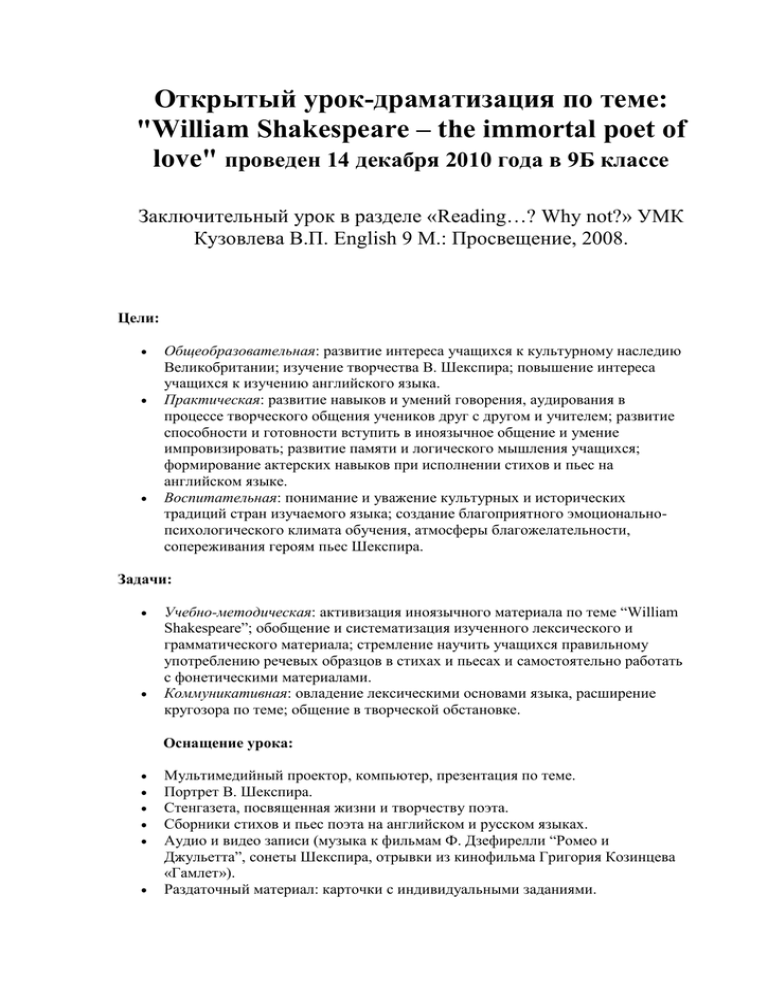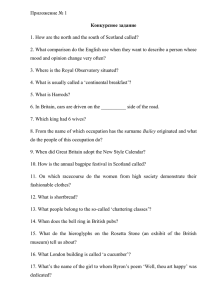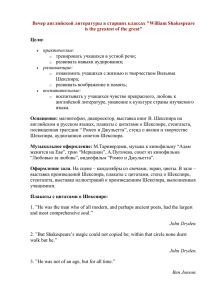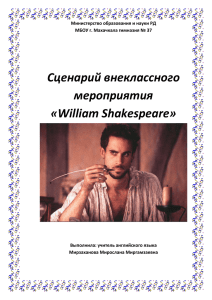"William Shakespeare – the immortal poet of love" проведен 14
advertisement

Открытый урок-драматизация по теме: "William Shakespeare – the immortal poet of love" проведен 14 декабря 2010 года в 9Б классе Заключительный урок в разделе «Reading…? Why not?» УМК Кузовлева В.П. English 9 М.: Просвещение, 2008. Цели: Общеобразовательная: развитие интереса учащихся к культурному наследию Великобритании; изучение творчества В. Шекспира; повышение интереса учащихся к изучению английского языка. Практическая: развитие навыков и умений говорения, аудирования в процессе творческого общения учеников друг с другом и учителем; развитие способности и готовности вступить в иноязычное общение и умение импровизировать; развитие памяти и логического мышления учащихся; формирование актерских навыков при исполнении стихов и пьес на английском языке. Воспитательная: понимание и уважение культурных и исторических традиций стран изучаемого языка; создание благоприятного эмоциональнопсихологического климата обучения, атмосферы благожелательности, сопереживания героям пьес Шекспира. Задачи: Учебно-методическая: активизация иноязычного материала по теме “William Shakespeare”; обобщение и систематизация изученного лексического и грамматического материала; стремление научить учащихся правильному употреблению речевых образцов в стихах и пьесах и самостоятельно работать с фонетическими материалами. Коммуникативная: овладение лексическими основами языка, расширение кругозора по теме; общение в творческой обстановке. Оснащение урока: Мультимедийный проектор, компьютер, презентация по теме. Портрет В. Шекспира. Стенгазета, посвященная жизни и творчеству поэта. Сборники стихов и пьес поэта на английском и русском языках. Аудио и видео записи (музыка к фильмам Ф. Дзефирелли “Ромео и Джульетта”, сонеты Шекспира, отрывки из кинофильма Григория Козинцева «Гамлет»). Раздаточный материал: карточки с индивидуальными заданиями. Ход урока 1. Организационный момент Вступительное слово учителя. Teacher: Good afternoon, everybody. I’m very glad to meet you. Today we have an unusual lesson. You have an excellent chance to plunge into the atmosphere of love and poetry, because our lesson is dedicated to the greatest playwright in world literature: William Shakespeare. I hope all of you will take an active part in it. Some students have learnt the most popular things written by great Shakespeare. Now listen to some of them. Ученикам раздаются карточки с текстом стихотворения и пояснениями к нему. W. Shakespeare “Goodbye love”. Sonnet LXXIII. That time of year thou mayst in me behold When yellow leaves, or none, or few, do hang Upon those boughs which shake against the cold, Bare ruin'd choirs where late the sweet birds sang. In me thou seest the twilight of such day As after sunset fadeth in the west, Which by-and-by black night doth take away. Death's second self, that seals up all in rest. In me thou seest the glowing of such fire That on die ashes of his youth doth lie, As the deathbed whereon it must expire, Consum'd with that which it was nourish'd by. This thou perceiv'st, which makes thy Love more strong, To love that well which thou must Leave ere long. Пояснения к стихотворению: thou – you doth – does; behold – see whereon – on which boughs – branches _ thy – your; his – its ere – before Подготовка ведется с использованием записи на аудиокассете и пояснения к стихотворению. Teacher: Thank you. I believe you have understood the main idea of this sonnet. At home you’ll try to translate it and make up a short story or a poem in Russian. 2. Основная часть урока Now we’ll listen to some facts from W. Shakespeare’s biography and the time when he lived and worked. На доске слайды с изображением мест, связанных с жизнью и творчеством Шекспира, сопровождаемые рассказами учащихся о его жизни и творчестве (презентации учащихся по теме). Pupil 1: The name of William Shakespeare is known al! over the world. The last half of the 16-th and the beginning of the 17-th centuries are known as the Golden Age of English Renaissance and sometimes are called 'The Age of Shakespeare'. Pupil 2: People often call Shakespeare 'Our National Bard', 'The Immortal Poet of Nature'. We really know few facts of his life and many of them are doubtful. But some facts are known to us and are proved by documents. Pupil I: The first facts of Shakespeare's biography are that he was born on April 23, 1564 in Stratford – on – Avon in the family of John and Mary Shakespeare. His father was a glove-maker and a dealer in corn, meat, wool. William's mother was a daughter of a rich farmer in the village of Wilmcote. Pupil 2: William went to a grammar school in Stratford and had quite a good education. There he learned to love reading. Pupil 1: We also know that, being 18 years old, William married Anne Hathaway, a farmer’s daughter, who was 9 years older that himself. We don’t know how he earned his living during these early years, perhaps he helped his father in the family business. During these years his three children were born: Susannah, the eldest and twins – a son Hamnet and a daughter Judith. Pupil 2: It's known that in 1567 Shakespeare went to London, leaving Anne and the children at home. We don’t know exactly why he did it. Pupil 1: Some people say that the reason was his love of poetry and theatre. But there is another story which says that he had to run away from law because he killed some deer belonging to a rich man. Pupil 2: In London Shakespeare began to act and to write plays and soon became an important member of a well-known acting company. Most of his plays were performed in the new Globe Theatre built on the bank of the River Thames. Pupil 1: It is known that only in 1613, at the height of his fame, Shakespeare returned to Stratford, where in April 23, 1616 he died. He was buried in a fine old church in Stratford. Teacher: Thank you very much for your information. Now I’m sure you know the main facts of Shakespeare’s biography. Now, look through the cards you have and say if it is true or false. Ученики работают с карточками. Card 2 Shakespeare was born in the 17-th century. Shakespeare’s father was a clock-maker. William was poorly educated, but loved reading. William married late, his wife was younger than him. William Shakespeare had twin daughters. In 1587 Shakespeare went to work in London. Shakespeare wrote plays for the new Globe Theatre. His wife Anne Hathaway loved theatre very much. Shakespeare never acted on the stage. Shakespeare died in London and was buried in Westminster Abbey. T. Thank you for your answers. I see that you know Shakespeare’s life rather well. And now I’d like to pay your attention to the best Shakespeare’s plays about love. Звучит песня из фильма Ф. Дзефирелли “Ромео и Джульетта” на английском языке. На экране заставка фильма «Ромео и Джульетта». Учащиеся разыгрывают сцену на балконе из трагедии В. Шекспира “Ромео и Джульетта”. Romeo. See how she leans her cheek upon her hand! О that I were a glove upon that hand, That I might touch that cheek! Juliet: Ay me! Romeo (aside). She speaks. О speak again, bright angel... Juliet. О Romeo, Romeo, wherefore art thou Romeo? Deny thy father, and refuse thy name; Or if thou wilt not, be but sworn my love, And I'll no longer be a Capulet. Romeo (aside). Shall I hear more, or shall I speak at this? Juliet. 'Tis but thy name that is my enemy; Thou art thy self, though not a Montague. What's Montague? It is nor hand, nor foot, Nor arm, nor face, nor any other part Belonging to a man. О be some other name! What's in a name? That which we call a rose By any other name would smell as sweet. So Romeo would, were he not Romeo called, Retain that dear perfection which he owes Without that title. Romeo doff thy name, And for thy name, which is no pi Take all myself. Romeo. I take thee at thy word: Call me but love, and I'll be new baptized; Henceforth I never will be Romeo By a name I know not how to tell thee who I am My name, dear saint, is hateful to myself Because it is an enemy to thee; Had I it written, I would tear the word. T. I see you’ve recognized the play. Pupil 1: Of course, it’s an immortal play about a love of two people Romeo and Juliet from two rich families the Capulets and Montagues who were enemies. Romeo and Juliet married secretly, but they couldn’t be together and they both killed themselves. They are typical examples of unfortunate, unhappy lovers. T. Right you are. It’s a very touching play. I believe you like it a lot and I hope you’ll read it yourselves. But now listen to the account from another Shakespeare’s play and tell us what play it is from. На экране кадры из фильма режиссера Григория Козинцева «Гамлет». Pupil 1: What mostly troubled the young prince was uncertainty about his father's death. Claudius told everybody that snake had bitten the King . The young prince, however, suspected that Claudius himself had killed the king. How right was he? What ought he to think of his mother? (From 'Hamlet, Prince of Denmark'.) Teacher: What was the name of young prince? You are right. His name was Hamlet. Now listen to an extract from this famous play. Pupil: To be, or not to be, that is the question: Whether 'tis nobler in the mind to suffer The slings and arrows of outrageous fortune: Or to take arms against a sea of troubles, And by opposing, end them? To die-, to sleep, No more, and, by a sleep to say the we and The heart-ache, and the thousand natural shocks That flesh in heir to; 'tis a consummation Devoutly to be wish'd. To die, to sleepTo sleep, perchance to dream.. Teacher: 'To be or not to be, that is the question’. What a great phrase it is! For one thing, when Shakespeare has said a thing, it seems impossible that it could ever be said in a better way. The little songs which appear in his plays are among the most charming gems of poetry in the English language. Pupil 1: Perhaps, some may wonder why Shakespeare has won fame as an immortal poet of love and one of the world's greatest poets. It would be very difficult to give a brief explanation. But open any of his plays and read and you'll immediately see why he has earned this praise. Pupil 2: Shakespeare seemed to know human nature through and through. The characters in his plays seem like living, with their weaknesses, people. There are many heroes among them, fine soldiers, and not too clever countrymen, tender ladies, and tigers in women's clothing. Shakespeare seemed to be able to show us almost every kind of man and woman, good and bad, and to know how to touch all our feelings, from sad to joyous. We cannot help feeling sorry when we see poor Juliet and Romeo, Hamlet and old King Lear. Pupil 1: Last of all, though Shakespeare wrote his plays only for the amusement of those who went to see them, they contain many good morals and ethical lessons, which can help those who read them to be better, wiser, and happier. Teacher: We know that Shakespeare wrote 38 plays and 154 sonnets. They all are very popular and loved by people. All of them were translated into different languages. Listen to one of his sonnets. СХХХ My mistress' eyes are nothing like the sun; Coral is far more red than her lips' red; If snow be white, why then her breasts are dun; If hairs be wires, black wires grow on her head, I have seen roses damask, red and white, But no such roses see I in her cheeks; And in some perfumes is there more delight Than in the breath that from my mistress reeks. I love to hear her speak, yet well I know I grant I never saw a goddess go; My mistress, when she walks, treads on the ground. And yet, by heaven, I think my love as rare As any she belied with false compare. Teacher: W .Shakespeare was the greatest and the best interpreter of human nature, the poet of the wildest sympathies ,of the most profound knowledge of mankind. It was human life that Shakespeare cared for .Our lesson is over. Thank you very much .I hope you’ve known a lot about the best English poet and you’ll learn one of his sonnets by heart .Good bye! 3. Подведение итогов урока. Оценки 4. Домашнее задание Подготовить сообщение о жизни и творчестве Шекспира. Выучить наизусть один из сонетов Шекспира.



